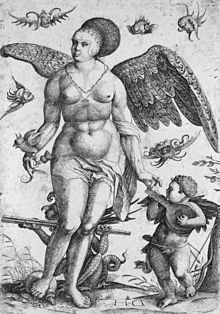Voluptas

Voluptas (engraving by Daniel Hopfer , around 1500)
Voluptas ( Latin for "lust", "pleasure", "enjoyment") is the personification of lust for life and sexual pleasure in Roman mythology . The equivalent of the voluptas in Greek mythology is hedone .
She is best known from the story of Amor and Psyche , which Apuleius embedded in his novel Metamorphoses . According to Apuleius, Voluptas is the daughter of Amor and Psyche.
Related to Voluptas was Volupia , the goddess of wellbeing, whose temple was at the Porta Romanula . It is not clear whether both are to be equated or whether they are different concepts. In any case, the cult of Volupia was ancient, as the statue of Angerona was located in her temple , which Pliny relates to the secret name of Rome.
literature
- Fehrle: Voluptas . In: Wilhelm Heinrich Roscher (Hrsg.): Detailed lexicon of Greek and Roman mythology . Volume 6, Leipzig 1937, column 371 ( digitized version ).